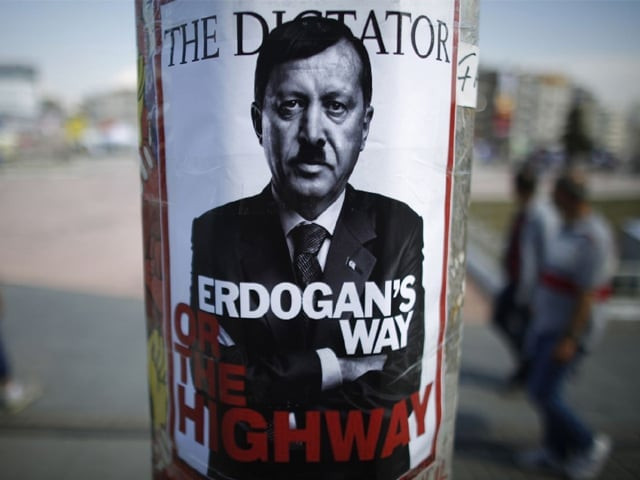“The mosques are our barracks,
The domes our helmets,
The minarets our bayonets,
And the faithful our soldiers…”
Turkish citizens should have known better than to vote him in as prime minister for 11 consecutive years, and eventually, the president of Turkey.
Known to the world of politics since decades, Erdogan isn’t a stranger to how the political clock ticks. He created the Justice and Development Party (AKP) in 2001, which raised him to unprecedented heights. To date, his status within the party remains undefeated, with no internal rival whatsoever, and no opposition party strong enough to take on a political giant like Erdogan.
Known as a hero in the municipal history of Istanbul, he was quick to emulate his past feats. He glorified democracy, made an earnest effort to prevent corruption (later to be involved in a corruption case himself), lowered state debt, increased trade and developed infrastructure. Political pundits termed this period of progression the ‘Silent Revolution’.
A membership in the revered NATO and his effort to get European Union members to grant Turkish citizens visa free travel within the Schengen zone further strengthened his role as a political maestro.
One can see why Erdogan gained unparalleled popularity amongst his people. He was rooting for all the right things.
But just as nearly every man sows the seeds of his own downfall, Erdogan, too, began setting the stage for his eventual downfall.
Seen as a threat to Kemal Ataturk’s secular policies by many in the judiciary, Erdogan, a ‘patient Islamist,’ enjoys a solid 12% support of hard-core Islamists and conservative voters. He is known to promote the Islamisation of education and social behaviour, and is stated to have said he wants to witness “the growth of a religious generation”. One of his party members even went to the extent of stating AKP may be foregoing secularism in order to implement a religious constitution.
This was met with extreme backlash, for obvious reasons. Promoting Islamisation in a region surrounded by an ISIS stronghold isn’t the greatest of policies. An attack on a music store in Istanbul in June 2016 by extremists may have very well been the outcome of Erdogan’s ever-growing stance on the Islamisation of the Turkish state. What was more alarming, though, was how protestors rallying against this attack were dispersed with tear gas and water cannons and a law prohibiting protests was implemented thereafter.
Echoes of his Islamisation policies were also witnessed in the outcome of the recent failed coup. Supporters of Erdogan gathered at Taksim square, chanting ‘Allah o Akbar’, verses were read from the Holy Quran, appeals from imams at mosques were made in order to garner support for Erdogan and appeals of execution for the coup plotters reverberated throughout the square. These scenes were an eerie re-embodiment of Sultan Suleiman’s reign, where treason was punishable through execution.
An Islamist state may very well also serve as a breeding ground for ISIS soldiers and attacks, as witnessed in the recent Istanbul Ataturk Airport – though that doesn’t seem to trouble Erdogan much. His foremost concern is towards the Kurdistan Worker’s Party (PKK).
Kurds in Turkey have undergone a cultural genocide, been brutally repressed by successive governments and were made to forcibly integrate into the state as a minority. Erdogan is known to use the war against Kurds to selfishly further his presidential agenda, but he is also aware of the fact that PKK is backed by strongholds in Iraq (Rojava) and the People’s Protection Units (YPG) in Syria. Therefore, Erdogan cannot afford to escalate the war against them or even fathom pushing the war beyond his borders.
What he’s more anxious about is the Independent Syrian Kurdistan party helping Turkish Kurds in plotting a revolutionary war within his dominion. Seeing how this matter is progressing, the only panacea to his fear regarding PKK is to sign a peace agreement and call for a ceasefire.
This option would have seemed plausible to many, but to Erdogan, it seems to translate into a sign of weakness.
In his rise to absolute power, evident through his wish to draft a new constitution granting him executive powers, he has managed to root out any sign of opposition, as seen with the PKK, followed by the army and the censorship of media and journalism.
In 2012, with the help of Fethullah Gulen, a former ally and a present arch nemesis, he conducted a witch hunt which witnessed the removal of army officers, falsely accused of plotting a coup against the government. It is rumoured Gulen may have set up his loyalists in place of the sacked officers, and these very same loyalists may have been the same men who planned the recent coup.
Erdogan’s panic and apprehension towards the army may have been the outcome of Turkey’s turbulent history with coups, in 1960, 1971, 1980 and 1997.
Meanwhile, Erdogan, slowly, yet steadily, marched on towards supremacy.
In the past year, he came down hard on news organisations, taking over one of Turkey’s main newspaper, Zaman, imprisoned journalists and banned Twitter and YouTube. Freedom, a vital foundation of democracy, began shrinking and Erodgan’s authoritarian power kept growing.
The recent coup will only feed Erdogan’s fears and suspicions and will further fortify his resolve to crush any parallel state wishing and waiting to evolve. A wolf in sheep’s clothing, Erdogan is waiting to pounce on any sign of rebellion, just as he is currently doing.
Throwing a childlike tantrum, Erdogan has blamed Gulen and Gulen loyalists for the failed coup, declared a state of emergency, demanded the American government to extradite Gulen and shut all institutions linked to Gulen. He ordered the arrests of thousands of judges and officers. The arrests are in vast numbers, so much so, prisons have run out of space and lower ranking officers have been imprisoned in schools and gymnasiums. It seems the failed coup has given Erdogan a blank cheque to dismiss basic human and democratic rights, something which most countries are outraged about – especially members of NATO.
Turkey had the right amount of secularism and was on its path to liberal development; a country which could very well serve as a role model for most Islamic countries, but Erdogan is adamant on destroying Turkey’s progressive image. What he needs is a reality check – the thousands of supporters who came out on the streets in an effort to avert the coup – were ardent supporters of democracy, not Erdogan.
Erodgan is on a rampage, a colossal beast no one dares stop.
It is only a matter of time before Erdogan tumbles off his throne, just like our very own despot, Ziaul Haq. Maybe he could take a page out of our history books and not repeat the same mistake. But ominous clouds are hovering above him and we can only wait and watch how another mighty man will crumble in his quest for absolute authority.



COMMENTS
Comments are moderated and generally will be posted if they are on-topic and not abusive.
For more information, please see our Comments FAQ